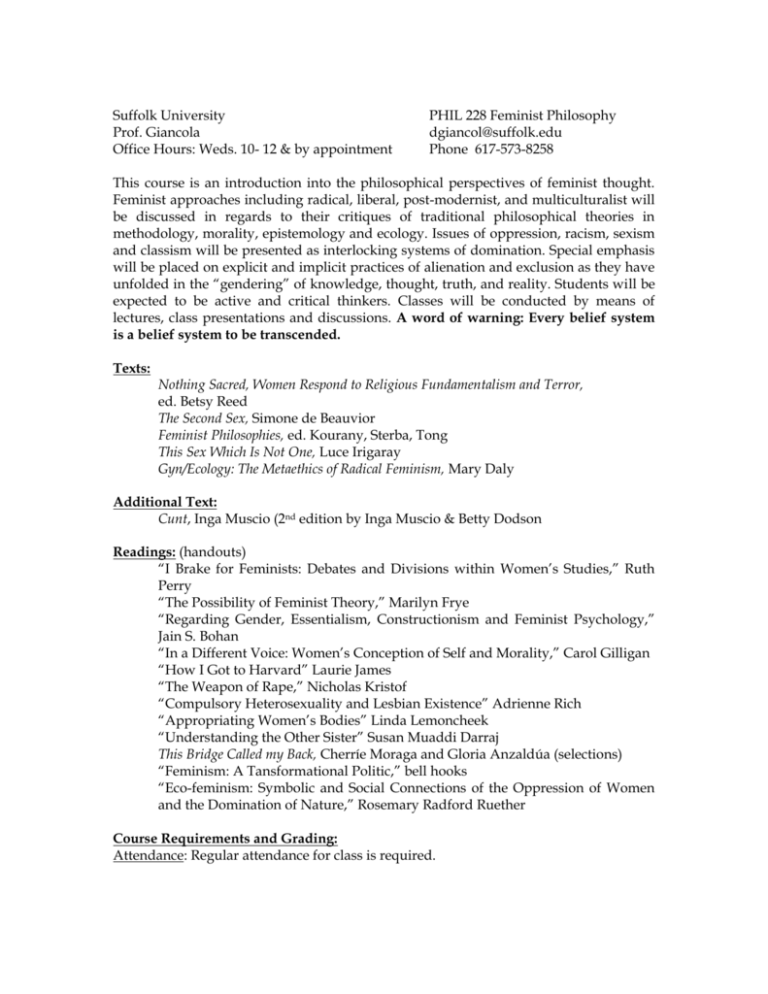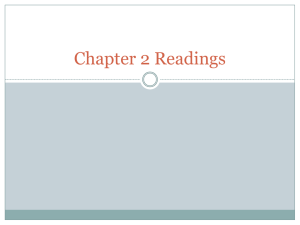course syllabus - herunderground.com
advertisement

Suffolk University Prof. Giancola Office Hours: Weds. 10- 12 & by appointment PHIL 228 Feminist Philosophy dgiancol@suffolk.edu Phone 617-573-8258 This course is an introduction into the philosophical perspectives of feminist thought. Feminist approaches including radical, liberal, post-modernist, and multiculturalist will be discussed in regards to their critiques of traditional philosophical theories in methodology, morality, epistemology and ecology. Issues of oppression, racism, sexism and classism will be presented as interlocking systems of domination. Special emphasis will be placed on explicit and implicit practices of alienation and exclusion as they have unfolded in the “gendering” of knowledge, thought, truth, and reality. Students will be expected to be active and critical thinkers. Classes will be conducted by means of lectures, class presentations and discussions. A word of warning: Every belief system is a belief system to be transcended. Texts: Nothing Sacred, Women Respond to Religious Fundamentalism and Terror, ed. Betsy Reed The Second Sex, Simone de Beauvior Feminist Philosophies, ed. Kourany, Sterba, Tong This Sex Which Is Not One, Luce Irigaray Gyn/Ecology: The Metaethics of Radical Feminism, Mary Daly Additional Text: Cunt, Inga Muscio (2nd edition by Inga Muscio & Betty Dodson Readings: (handouts) “I Brake for Feminists: Debates and Divisions within Women’s Studies,” Ruth Perry “The Possibility of Feminist Theory,” Marilyn Frye “Regarding Gender, Essentialism, Constructionism and Feminist Psychology,” Jain S. Bohan “In a Different Voice: Women’s Conception of Self and Morality,” Carol Gilligan “How I Got to Harvard” Laurie James “The Weapon of Rape,” Nicholas Kristof “Compulsory Heterosexuality and Lesbian Existence” Adrienne Rich “Appropriating Women’s Bodies” Linda Lemoncheek “Understanding the Other Sister” Susan Muaddi Darraj This Bridge Called my Back, Cherríe Moraga and Gloria Anzaldúa (selections) “Feminism: A Tansformational Politic,” bell hooks “Eco-feminism: Symbolic and Social Connections of the Oppression of Women and the Domination of Nature,” Rosemary Radford Ruether Course Requirements and Grading: Attendance: Regular attendance for class is required. Class Materials: Handouts and additional course materials are available at www.herunderground.com (see classes) Class participation: Students are expected to arrive at class on time and prepared. You are responsible for all material and assigned texts. You are responsible for all weekly reading and writing assignments. In addition you are also required to be active participants in both formal and informal class discussions, presentations and debate. Weekly Reading Assignments: Students will be expected to keep up with weekly reading assignments as indicated in the course calendar. Weekly Writing Assignments: Students will be expected to keep a weekly journal (1-2 pp. per entry) detailing thoughts and analysis on readings and class discussions. Presentations: Students will give two ten minute class presentation. Research Paper/Final: One ten page research paper complete with thesis, bibliography and footnotes will be due at the end of the semester. Students will be expected to follow MLA guidelines. Grading Policy: The grade for the course will consist of an average of the journal, presentations, and research paper. Students will be provided with the opportunity of earning extra credit by attending philosophy department lectures/events and submitting a written analysis (1 p.). Any additional credit after that is based on class participation and effort and completely dependent upon the judgment of the professor. Incompletes: This professor does not give “incompletes” without a compelling reason. Note that according to CAS policy on incompletes, work not completed within one calendar year will automatically and irrevocably turn the final course grade to “F”. Plagiarism: Plagiarism is a serious offense. Please see CAS policy guidelines. Course Calendar: Sept. 2: introduction to feminist theory, what is feminism, how is it different from traditional philosophical theory, radical roots of feminism, divisions between feminist (essentials, post-modernist, radical lesbians, Marxist, socialist, multiculturalists, etc.) Sept. 9: problems of framing, methodology and feminist methodology, epistemology and the problem with philosophy, essentialist and deconstruction (post modernist) debate. READ: “I Brake for Feminists: Debates and Divisions within Women’s Studies,” “The Possibility of Feminist Theory,” Marilyn Frye “Regarding Gender, Essentialism, Constructionism and Feminist Psychology,” Jain S. Bohan Sept 16: class presentations on Feminist Philosophies, Kourany, Sterba, Tong Sept. 23: (class presentations)women as other, epistemology, the gendering of knowledge, patriarchy and gender roles, biology as destiny, nurture vs. nature. READ: The Second Sex, Simone de Beauvior Sept. 30: morality and identity, moral repression, learning the narrative. READ: “In a Different Voice: ” Carol Gilligan “How I Got to Harvard” Laurie James Oct. 7: religious fundamentalism and oppression, religion and culture wars against women READ: Nothing Sacred, Women Respond to Religious Fundamentalism and Terror, ed. Betsy Reed “The Weapon of Rape,” Nicholas Kristof Oct. 15-22: feminism and sexuality, self defined sexual identity, the naming of desire READ: This Sex Which is Not One, Luce Irigaray Oct. 29: sexuality and feminist identity, lesbian ethics and radical feminism, practices of alienation, oppression and deception, lesbian ethics. READ: “Compulsory Heterosexuality” Adrienne Rich “Appropriating Women’s Bodies” Linda Lemoncheek Nov. 5: Film: Mindwalk with 2 pp. response paper. Nov. 12: feminist social and cultural ideologies, multiculturalism and feminism. READ: “Understanding the Other Sister” Susan Muaddi Darraj This Bridge Called my Back, Cherríe Moraga and Gloria Anzaldúa “Feminism: A Tansformational Politic,” bell hooks Nov. 19: eco-feminism, feminism and deep ecology, “metaethics of radical feminism.” READ: Gyn/Ecology, Mary Daly (introduction) “Eco-feminism: Symbolic and Social Connections of the Oppression of Women and the Domination of Nature,” Rosemary Radford Ruether Nov. 25 – Dec. 2: class discussion, envisioning a feminist politic/ spirituality READ: Cunt, Inga Muscio Papers Due! "I am not interested in pursuing a society that uses analysis, research, and experimentation to concretize their vision of cruel destinies. . . a society with arrogance rising, moon in oppression and sun in destruction." Barbara Cameron from This Bridge Called my Back "The women's movement is the greatest single hope for the survival of spiritual consciousness on this plantet." Mary Daly









